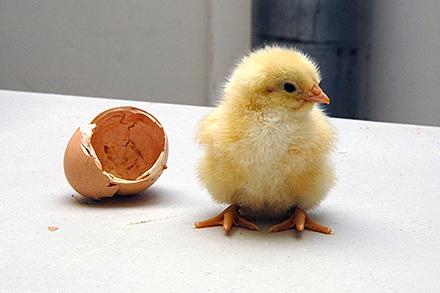
The Chicken, the Egg, and Salmonella
Science enables hens to pass on immunity through their eggs
If you are one of the nearly 1.35 million Americans who are unlucky enough to contract Salmonella each year, this news is for you. If you'd like to avoid joining their number, this is for you, too.
Scientists with the Agricultural Research Service (ARS) are making headway on their efforts to give hens the ability to pass on some Salmonella immunity to their chicks.
Salmonella is a bacterial disease that affects the intestinal tract and causes diarrhea (sometimes bloody), fever, stomach cramps, nausea, vomiting, and headache. Each year about 26,500 Americans end up in the hospital and 420 die as a result of it. Contaminated food is the primary cause, and chicken is the culprit about 20% of the time.
Researchers and public health experts have made many attempts to reduce or eliminate Salmonella bacteria, including proper food handling and preparation and cleanliness at all levels of the food production chain. Many of these methods have helped, but Salmonella remains a serious problem.
"Despite control efforts, foodborne illnesses due to Salmonella continue to impact [people]," said Christina Swaggerty, microbiologist with the ARS Food and Feed Safety Research unit in College Station, TX. 'Our ‘pre-harvest' food safety research program is focused on reducing the load of these bacteria in the live chicken, so birds entering the processing plant have less likelihood of contaminating the end product that reaches the consumer."
In addition to ARS, the team routinely collaborates with researchers from colleges and universities, and stakeholders from the poultry and animal feed industries. Their broad-spectrum approach includes targeting management practices on the farm, naturally boosting birds' immune responses, and finding suitable antibiotic alternatives for the poultry industry.
One of the approaches they are employing to combat Salmonella in poultry, Swaggerty said, is to develop "transgenerational protection" against bacterial infection in broiler chickens. Broiler chickens are raised for their meat, as compared to layer chickens, which are raised for their eggs.
 This broiler chick may have increased immunity to Salmonella, thanks to ARS research. (Photo by Robert Droleskey, ARS)
This broiler chick may have increased immunity to Salmonella, thanks to ARS research. (Photo by Robert Droleskey, ARS)
"Our approach to transgenerational protection means we are focusing on two generations of chickens: the broiler breeder hens, and their offspring," Swaggerty explained. "We want to determine if it is possible to naturally boost the immune response of the broiler breeder hens, and then to test if their chicks (also) have a stronger immune response and are more resistant to Salmonella infections — thus, across generations, or 'transgenerational'."
To boost a hen's immunity, the researchers are adding antibiotic alternative products, such as natural botanicals (plants or plant extracts that offer some type of therapeutic benefit) or other biofactors to chicken feed. Biofactors are elements the body needs to function properly and help prevent disease. Swaggerty said that all meat-producing industries are reducing the quantity of traditional antibiotics they use, and are instead turning to natural products as an alternative.
After feeding supplements to hens, researchers collected their eggs and found what they were hoping for.
"We hatched the eggs and found that hens on the supplemented diet produced chicks that were more resistant to Salmonella infection compared to chicks that were hatched from hens on a control diet with no supplementation," Swaggerty said. "This is important because if you can start with young chicks that are naturally more resistant to Salmonella, they are less likely to be a source of contamination to the consumer."
At this point, the new research joins traditional Salmonella-reducing practices, such as sanitation and proper food handling. The result could be safer poultry products and lower prices for consumers.
"Chickens with an effective immune response will be able to react to a broad range of foodborne and poultry pathogens quickly and efficiently," Swaggerty said. "Reducing early chick sickness and death will reduce the cost of the product reaching the consumer, but — even more importantly — an effective early immune response allows the birds to fight off infections and stay healthy." — by Scott Elliott, ARS Office of Communications.
